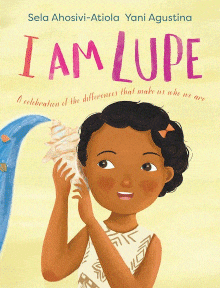
I am Lupe
I am Lupe
Sela Ahosivi-Atiola
Yani Agustina
Lothian, 2023
32pp., hbk., RRP $A24.99
9780734422538
Unlike her classmates, Lupe has curly black hair just like her dad, deep brown eyes just like her mum and the coconut oil her mum lathers into her brown skin each day makes it glisten in the sunlight. And her friends ask about those differences, making Lupe feel awkward because she doesn’t know what to say. And her mother’s answer shows that in reality, Lupe is just like every other kid – she is a daughter, a big sister, a friend, fearless and funny… she is who she is and that is enough.
This theme of a child being physically different from their peers is common among picture books for young children such as the magnificent Eyes that Kiss in the Corners as is the revelation that despite our appearances, we share more similarities than differences. Written by a Tongan-Australian writer this story opens up a different part of the world for many because Lupe is of Tongan descent – “I was born in … the first place on earth to see the sunrise each day” – and stories that have children from the Pacific Islands as their lead characters are rare. From the teachers notes we learn that the fish dish her mother is preparing is ota ika, a raw fish salad, offering the opportunities to not only investigate the traditional foods of Tonga, but also the traditional ways that fish is prepared in other cultures – it’s not always fried and served with chips. And that can lead to all sorts of investigations about our Pacific neighbours allowing our students from those countries to share their stories and have their heritage acknowledged.
Over my 50+ years of working with children, I have never worked in a classroom where there were only “white Anglo-Saxon” children as Lupe’s class appears to be, and there would be few nationalities I haven’t encountered, and the greatest joy has been not only seeing the children all meld together as one getting on with the business of being a child and learning and playing together, but all that they have taught me over the years. And while I’ve not directly experienced the sort of open conversation that Lupe has with her peers, I do know that often kids see their own differences as being bigger than they really are and that this can lead to self-consciousness and anxiety, so the more we share these sorts of books and reassure them that regardless of red hair, wheelchairs, purple skin or knobbly knees, who they are is enough and welcome, the better. To have one in which our Pacific nations kids can see themselves, is a bonus.
